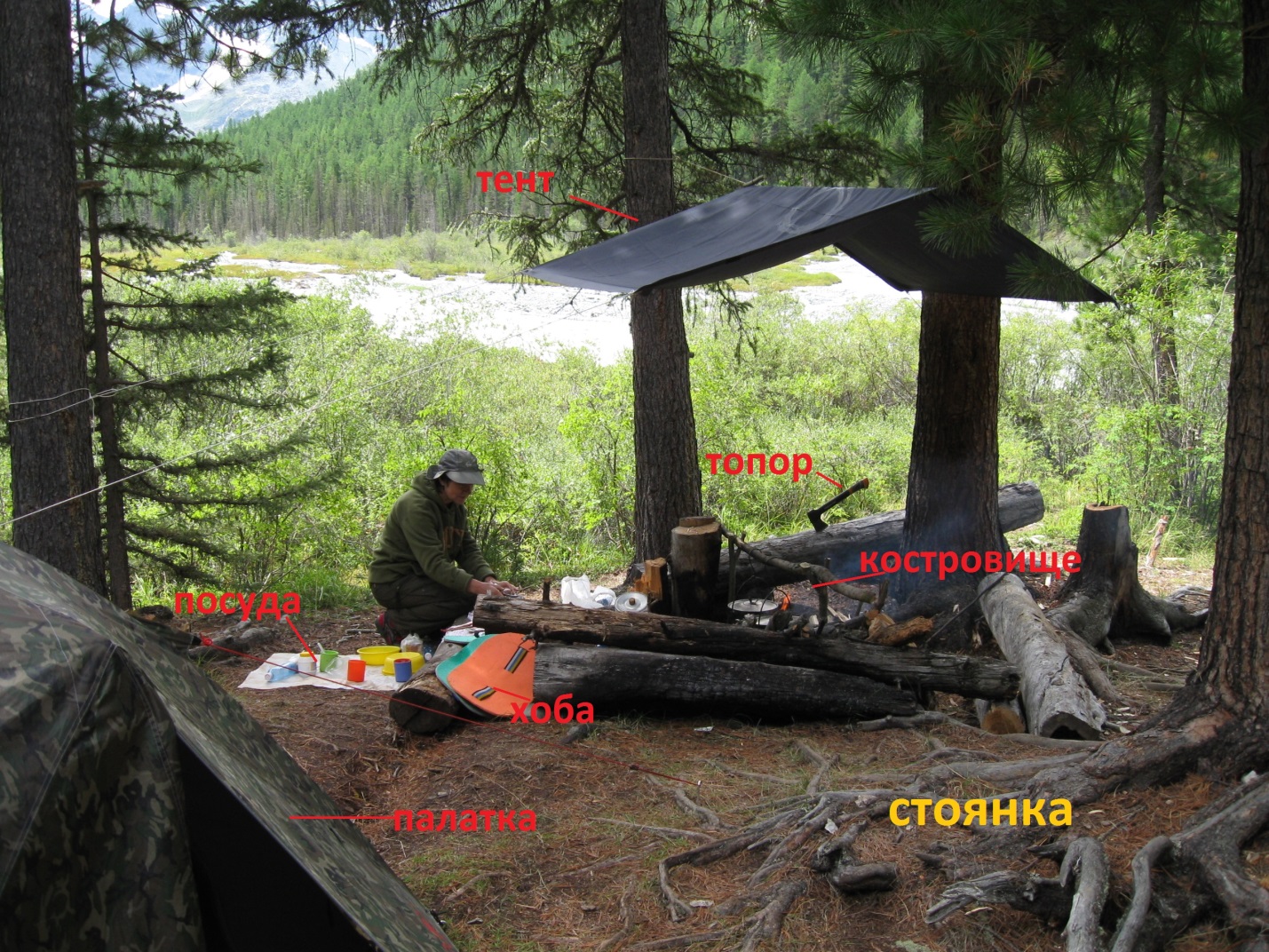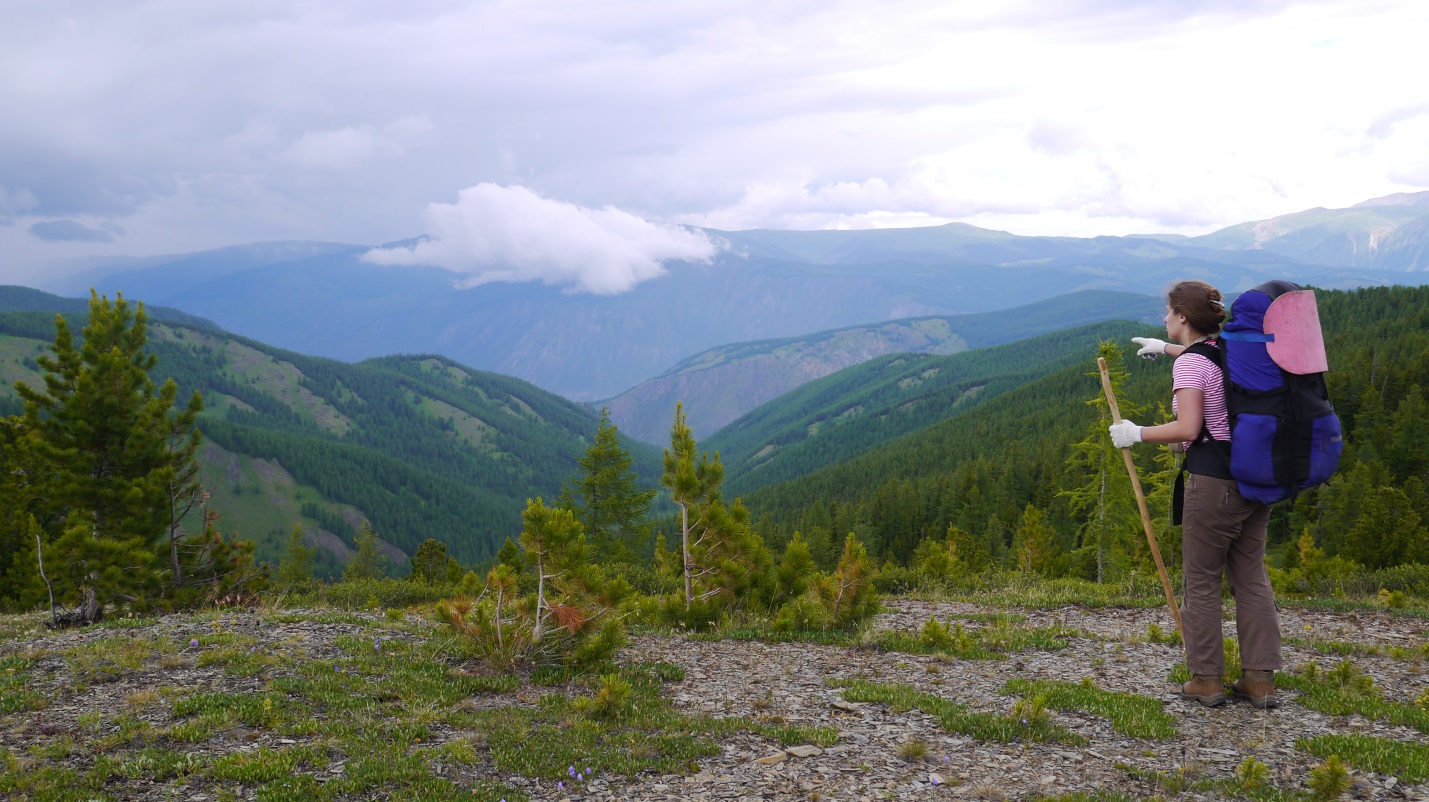Have you ever gone on a hiking trip? Are you tempted to go in the near future? Do you want to learn special hiking-related vocabulary? If you answered yes to any of these questions, then this article might just be of interest to you.
When I was younger, I had never dreamt of traveling on foot, living in a tent or cooking over the fire, but one fine day my parents caught the hiking fever and it spread to the whole family in no time. So, we became backpackers…
Let’s get started with our Russian hiking trip
The Russian word похо́д (hiking trip) derives from the word ходи́ть (to go, to walk) which is quite logical, don’t you think? Hikers mostly walk all day in search of beautiful scenery. In Russian, we can call hikers тури́сты or похо́дники (i.e. people who go for a hike).
Interestingly, among the experienced похо́дники there is a special term for the lazy hikers who prefer staying in a tent or on a campsite rather than do the actual walking. They’re called матра́сники (which comes from матра́с meaning mattress).
The word is slightly pejorative, but it’s very often used jokingly when laughing about someone who’s resting a lot or has spent the whole day sleeping in the tent (perhaps due to bad weather)!
Anyway, when we идём в похо́д (go hiking), what gear do we need? I think the most obvious answers would include 3 basic things:
- рюкза́к (backpack; rucksack)
- пала́тка (tent)
- спа́льник (sleeping bag, from спать meaning to sleep)

(Personal image)
Below is a typical dialogue using the hiking words we just learned :
— Ребя́та, вот хоро́шее ме́сто! Снима́ем рюкзаки́ и ста́вим пала́тки!
— Отли́чно! У меня́ тако́й тяжёлый рюкза́к! Я давно́ мечта́ю его снять и зале́зть в пала́тку.
— Guys, here is a good place. Let’s take our backpacks off and set up the tents!
— Excellent! I’ve got such a heavy backpack! I’ve been dreaming of taking it off and getting into the tent for a long time.
There is a kind of joke among the hikers who know how it feels to carry a heavy backpack and are therefore eager to eat the food to make the load lighter :
- Лучше килограмм в животе, чем 100 грамм на спине.
I’d rather have 1 kilo in my stomach than 100 gr in my backpack.
OK, but how would you feel if you had only рюкза́к, пала́тка and спа́льник? They’re surely not enough! Many people forget that похо́дники need good hiking boots — боти́нки. A pair of good боти́нки will help you follow the trail (идти́ по тропе́) with ease and feel secure on the rocks (куру́м). A walking stick (па́лка) or a pair of telescopic sticks would do no harm either, especially while climbing down the steep slopes or scrambling in the rain.

(Personal image)
On the other hand, there are two very important mats: пе́нка (or ко́врик) and хо́ба. Пе́нка is a big mat used for sleeping. Its name comes from its structure, which resembles пе́на (foam).
Хо́ба means a tiny sitting mat that can be fastened with a belt to a hiker’s waist and that guarantees a comfortable stay on a wet/cold surface. Its name originally comes from an exclamation that expresses satisfaction when finding or achieving something; in this case, getting to sit at last after a long day walking!
Check the following typical dialogue:
— Кто положи́л на мою хо́бу свои гря́зные боти́нки??
— Как, это твоя ́хо́ба? Я ду́мал, это моя́! Извини́…
— Who’s put their dirty hiking boots onto my sitting mat??
— Oh, is this your sitting mat? I thought it was mine! Sorry…

(Personal image)
But, we have completely forgotten about perhaps the most important part of the hiking life which is eating (and also cooking)! While hiking, it’s essential to find a good place to stay — стоя́нка (from стоя́ть meaning to stand, to stop). A good стоя́нка would include space for пала́тки (tents) and кострови́ще (a place for the camp fire, from костёр meaning camp fire).
A good стоя́нка shouldn’t be far from a source of water and a forest where hikers would easily find дрова́ (firewood).
So, what gear is needed for cooking over the fire? The two basic things are:
- топо́р (axe)
- котелки́ (kits, pots)

(Personal image)
Before we go on exploring the food topic, let’s look at the dialogue:
— Ну что, стоя́нка отли́чная!
— Да, от воды́ недалеко́ и кострови́ще гото́вое.
— Я беру́ топо́р и иду́ за дров́ами. А ты бери́ котелки́ и — за водо́й!
— Well, the camp site is excellent!
— Yeah, it’s not far from the water, and there is also a place for a campfire.
— I’m taking the axe and going to collect some firewood. As for you, take the kits and get some water.
So far, we’ve filled our котелки́ with water, cut дрова́ and prepared everything for cooking. But what about food? What do we usually eat on a hiking trip? Most people traditionally go for консе́рвы (canned food) and various ка́ши (cereals).
In my family we don’t use canned food for two reasons. First, it’s heavy because of its metal packaging. Second, it’s difficult to dispose of. Since we don’t want to leave tons of waste after us, we usually prepare тушёнка (canned stewed meat) ourselves and pack it into a paper carton. We can easily manage without traditional cгущёнка (canned condensed milk) or other sorts of консе́рвы.
My family’s typical раскла́дка (food supply or “spread”, from раскла́дывать meaning distribute) contains:
— кру́пы для ка́ши (cereals, grains), рис (rice) и макаро́ны (pasta)
— сухо́е молоко́ (milk powder)
— тушёнка (stewed meat)
— копчёная колбаса́ (smoked sausages)
— сыр (cheese)
— сухари́ (rusk - a type of dried bread)
— пече́нье (biscuits)
— шокола́д (chocolate)
— сухофру́кты (dried fruit) и оре́хи (nuts)
— лук (onion) и чесно́к (garlic)
— са́хар (sugar) и соль (salt)
— сухи́е супы́ (dry soup mixes)

(Personal image)
We prefer cooking full meals to snacks, so for breakfast there is sweet моло́чная ка́ша (cereal with milk), for lunch we eat суп с сухаря́ми (soup with rusk) and in the evening — каша с тушёнкой (cereal with stewed meat).
A typical dialogue before cooking a meal:
— Что сего́дня ва́рим на у́жин?
— Дава́йте макаро́ны, они самые тяжёлые.
— Отли́чная иде́я! Кстати, у кого́ по раскла́дке тушёнка?
— У меня́!
— Отли́чно! Неси́ скоре́е и не забу́дь пече́нье к ча́ю.
— What are we going to cook for dinner today?
— Let’s cook pasta, it’s the heaviest of all.
— An excellent idea! By the way, who’s carrying stewed meat?
— Me!
— Excellent! Bring it quickly, and don’t forget the biscuits for tea.
And, now you’re ready for a hiking trip in Russian. Choose a trail with good view, and don’t forget to bring your camera. As for me, I’d like to wish you the most important thing — good weather.
— Хоро́шей пого́ды и уви́димся на тропе́!
— Wishing you good weather, and see you on the trail!

(Personal image)
For those who’re really keen on learning the hiking-related vocabulary, here is a word puzzle. Solve it, and find the name of a very beautiful Altay mountain hidden in the bold squares.
1 across: hiking boots
2 across: camping kits
3 across: a sleeping bag
4 across: canned stewed meat
5 across: a sitting mat
6 across: a tent








